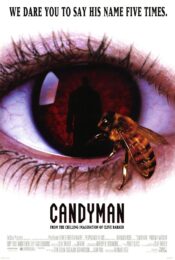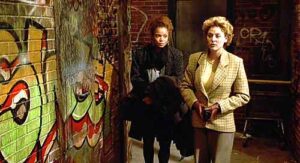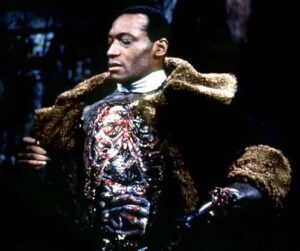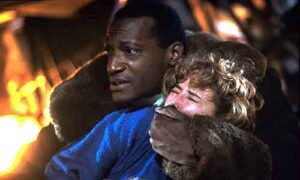This racially tinged gorefest is a standout horror film of the 1990s, and one of the best Clive Barker adaptations to date.
CANDYMAN (1992) was the third feature directed by England’s Bernard Rose, and fulfilled the promise of his first, 1988’s PAPERHOUSE. Adapted from Clive Barker’s BOOKS OF BLOOD story “The Forbidden,” CANDYMAN was a sizeable hit, and solidified the status of its headliner Tony Todd (coming off the 1990 NIGHT OF THE LIVING DEAD remake) as a genre icon.
Also featured were eighties mainstay Virginia Madsen, SILENCE OF THE LAMBS’ Kasi Lemmons (the future director of films like EVE’S BAYOU and THE CAVEMAN’S VALENTINE), Xander Berkeley (who all-but specialized in playing assholes in 1990s cinema) and composer Philip Glass. Glass famously kept his score from being released on CD for several years, as he didn’t like the movie (Glass, for the record, claimed he found it “too violent,” although he subsequently lent his talents to SECRET WINDOW and TAKING LIVES, neither of which is known for its restraint).
Helen is a graduate student researching urban legends. She decides to center her thesis on the figure of Candyman, a murdered slave whose hook wielding spirit allegedly haunts a crime-ridden Chicago housing project. Exploring the project, Helen becomes obsessed with disproving Candyman’s existence…and in the process inadvertently calls him up!
Helen comes to in the middle of a gory crime scene, and is immediately suspected of killing a black woman’s dog and kidnapping her child. Helen begins losing her mind, and grows even more deranged after a psychiatrist she’s speaking to one day gets disemboweled by Candyman. She escapes from the institution where she’s interred, only to arrive home and discover her a-hole husband shacked up with another woman. This does nothing to help Helen’s mental state, and she winds up back in Candyman’s lair for a final, fateful encounter.
So assured is Bernard Rose’s direction that one is nearly persuaded to overlook the fact that his narrative is perilously thin. This is inevitable in a film adapted from a short story—and, in the case of Clive Barker’s “The Forbidden,” an extremely simple short story.
But Rose works overtime on the nuances of his screenplay, adding a pointed racial angle in the figure of the African-American Candyman (in the story the character could change his skin tone at will) that was quite pertinent in 1991. Rose also wreaks many clever twists on quite a few moldy horror tropes. He makes Candyman, played by Tony Todd, a non-wisecracking flesh-and-blood character far from the Jason/Freddie model, while the heroine, played by Virginia Madsen, is quite different from the standard horror movie babe. Madsen’s Helen is a complicated, prickly and ultimately vengeful gal who doesn’t do any screaming and is never presented as a sexual object (this despite the fact that Madsen spent much of the 1980s playing bimbos).
Rose shot the film largely in Cabrini-Green, an actual Chicago housing project. Such authenticity enhances this low budget film considerably, as does the lyrical and hypnotic score by Philip Glass, which ranks among the latter’s finest-ever work. It’s all so fine that just as one may be persuaded to overlook the thinness of the narrative, you might also be willing to forgive the severely half-baked final scene, which, frankly, sucks.
Vital Statistics
CANDYMAN
Tristar Pictures
Director: Bernard Rose
Producers: Steve Golin, Sigurjon Sighvatsson, Alan Poul
Screenplay: Bernard Rose
(Based on “The Forbidden” by Clive Barker)
Cinematography: Anthony B. Richmond
Editing: Dan Rae
Cast: Virginia Madsen, Tony Todd, Kasi Lemmons, Xander Berkeley, Vanessa Williams, Dejuan Guy, Marianna Eliott, Ted Raimi, Ria Pavia, Mark Daniels, Lisa Ann Poggi, Adam Philipson





